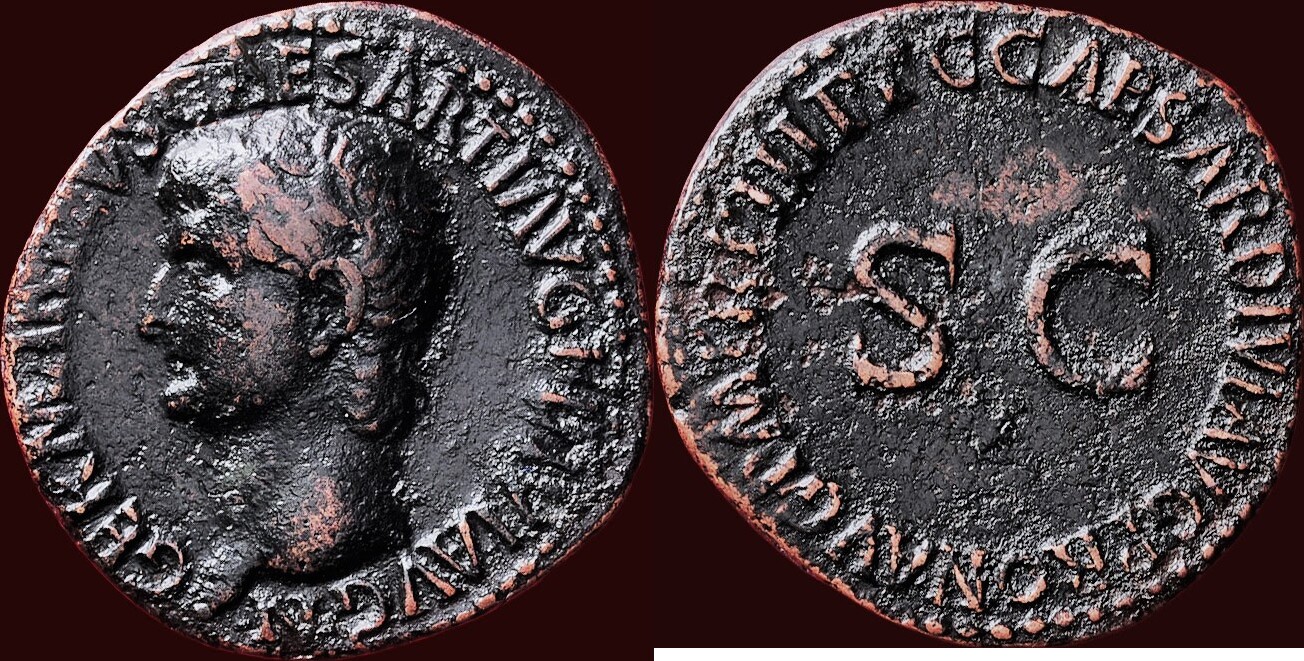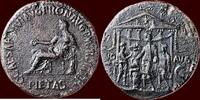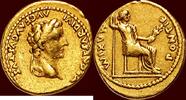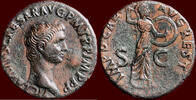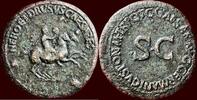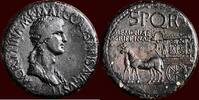MA-号码: 7842202010
Roman Empire AE As (39-40) GERMANICUS, father of Caligula - Rome vf-
Munthandel G.Henzen 

10
On MA-Shops since 10 years
7244 评分,
100 % 正面Positive (过去24个月)
Worldwide shipping
4,574.15 元550,00 EUR
Import tax may be added
+ 415.83 元 运费 ( to China )
寄运时间: 7 到 10 天
+ 415.83 元 运费 ( to China )
| +49 (0)2871 2180 383 |
| 支付方式 |
| 电汇 |
weight 9,29gr. | copper Ø 28mm.
obv. Bare head of Germanicus left, surrounded by the legend
GERMANICVS CAESAR TI AVG F DIVI AVG N
rev. Large S C, surrounded by the legend
C CAESAR DIVI AVG PRON AVG P M TR P III P P
variant the obverse legend usually is with AVGVST instead the here used AVG
Germanicus was born in Rome on 24 May 15 BC. The son of Nero Claudius Drusus and Antonia the Younger, Germanicus was born into an influential branch of the patrician gens Claudia. The agnomen Germanicus was added to his full name in 9 BC when it was posthumously awarded to his father in honor of his victories in Germania. In AD 4 he was adopted by his paternal uncle Tiberius, himself the stepson and heir of Germanicus′ great-uncle Augustus, who in turn was adopted by Augustus. As a result of his adoption, Germanicus became an official member of the gens Julia, another prominent family, to which he was related on his mother′s side. Germanicus thus became a possible candidate for the title of emperor. In 5 AD his connection to the Julii Caesares was further consolidated through a marriage between him and Agrippina the Elder, a granddaughter of Augustus. Caius, the later emperor Caligula, was born from this marriage. During the reign of Augustus, Germanicus enjoyed an accelerated political career, entering the office of quaestor five years before the legal age in 7 AD. He held that office until 11 AD, and was elected consul for the first time in 12 AD. The year after, he was made proconsul of Germania Inferior, Germania Superior, and all of Gaul. From there he commanded eight legions, about one-third of the entire Roman army at the time, which he led against the Germanic tribes in his campaigns from AD 14 to 16. In 16 AD his greatest campaign was prepared, with the Island of the Bataven (the Betuwe) serving as a rallying point. The Batavians were important allies of the Romans and at the river Weser, at the plain of Idavisto, they launched an attack together against the Angrivarians and other Germanic tribes led by Arminius. The Batavian leader Chariovalda lost his life, but in the end they managed to defeat the Germans. He avenged the Roman Empire′s defeat in the Teutoburg Forest and retrieved two of the three legionary eagles that had been lost during the battle. During Germanicus′ stay in Germania, Emperor Augustus was in 14 AD deceased and succeeded by his adoptive son Tiberius. Germanicus was called back to Rome by Tiberius, where he held a grand triumphal procession on 26 May 17 AD to celebrate his successes in Germania. Then Germanicus was transferred to the east to reorganize the provinces of Asia Minor, whereby he incorporated the provinces of Cappadocia and Commagene in AD 18. Possibly Tiberius and Livia wanted to get rid of him. While in the eastern provinces, Germanicus came into conflict with the governor of Syria, Cnaeus Calpurnius Piso. During their feud, Germanicus became ill in Antiochia and died on 10 October 19 AD. His death has been attributed to poison by ancient sources, but that was never proven. As a famous general, he was widely popular and regarded as the ideal Roman long after his death. To the Roman people, Germanicus was the Roman equivalent of Alexander the Great due to the nature of his death at a young age, his virtuous character, his dashing physique, and his military renown. Germanicus never became emperor, but his son Caius eventually did, who had this coin minted as a tribute to his father. Cohen 4var. | RIC 43var. (R2) | BMC 60var. | Sear 1822var. RR
Minor traces of oxitation. Dark brown patina. Very rare.
vf-
obv. Bare head of Germanicus left, surrounded by the legend
GERMANICVS CAESAR TI AVG F DIVI AVG N
rev. Large S C, surrounded by the legend
C CAESAR DIVI AVG PRON AVG P M TR P III P P
variant the obverse legend usually is with AVGVST instead the here used AVG
Germanicus was born in Rome on 24 May 15 BC. The son of Nero Claudius Drusus and Antonia the Younger, Germanicus was born into an influential branch of the patrician gens Claudia. The agnomen Germanicus was added to his full name in 9 BC when it was posthumously awarded to his father in honor of his victories in Germania. In AD 4 he was adopted by his paternal uncle Tiberius, himself the stepson and heir of Germanicus′ great-uncle Augustus, who in turn was adopted by Augustus. As a result of his adoption, Germanicus became an official member of the gens Julia, another prominent family, to which he was related on his mother′s side. Germanicus thus became a possible candidate for the title of emperor. In 5 AD his connection to the Julii Caesares was further consolidated through a marriage between him and Agrippina the Elder, a granddaughter of Augustus. Caius, the later emperor Caligula, was born from this marriage. During the reign of Augustus, Germanicus enjoyed an accelerated political career, entering the office of quaestor five years before the legal age in 7 AD. He held that office until 11 AD, and was elected consul for the first time in 12 AD. The year after, he was made proconsul of Germania Inferior, Germania Superior, and all of Gaul. From there he commanded eight legions, about one-third of the entire Roman army at the time, which he led against the Germanic tribes in his campaigns from AD 14 to 16. In 16 AD his greatest campaign was prepared, with the Island of the Bataven (the Betuwe) serving as a rallying point. The Batavians were important allies of the Romans and at the river Weser, at the plain of Idavisto, they launched an attack together against the Angrivarians and other Germanic tribes led by Arminius. The Batavian leader Chariovalda lost his life, but in the end they managed to defeat the Germans. He avenged the Roman Empire′s defeat in the Teutoburg Forest and retrieved two of the three legionary eagles that had been lost during the battle. During Germanicus′ stay in Germania, Emperor Augustus was in 14 AD deceased and succeeded by his adoptive son Tiberius. Germanicus was called back to Rome by Tiberius, where he held a grand triumphal procession on 26 May 17 AD to celebrate his successes in Germania. Then Germanicus was transferred to the east to reorganize the provinces of Asia Minor, whereby he incorporated the provinces of Cappadocia and Commagene in AD 18. Possibly Tiberius and Livia wanted to get rid of him. While in the eastern provinces, Germanicus came into conflict with the governor of Syria, Cnaeus Calpurnius Piso. During their feud, Germanicus became ill in Antiochia and died on 10 October 19 AD. His death has been attributed to poison by ancient sources, but that was never proven. As a famous general, he was widely popular and regarded as the ideal Roman long after his death. To the Roman people, Germanicus was the Roman equivalent of Alexander the Great due to the nature of his death at a young age, his virtuous character, his dashing physique, and his military renown. Germanicus never became emperor, but his son Caius eventually did, who had this coin minted as a tribute to his father. Cohen 4var. | RIC 43var. (R2) | BMC 60var. | Sear 1822var. RR
Minor traces of oxitation. Dark brown patina. Very rare.
vf-
Please respect our order minimum of 20 Euros. For EU only IBAN payment please. Shippings to China are on risk of the buyer and only payment by bankwire or WISE. Shipping will take place within 5 days after receipt of payment. Sendings to Russia,Ukraine and Israel are not possible. Additional administration- and risk costs for PayPal & creditcard payments. No PayPal or creditcardpayments possible for orders over 10.000 euro.
| Shipping fees | ||||
|---|---|---|---|---|
| up to 831.66 元 | 831.66 元 to 4,158.32 元 | 4,158.32 元 to 8,316.63 元 | over 8,316.63 元 | |
| Argentina | 266.13 元 | 266.13 元 | 332.67 元 | 332.67 元 |
| Australia | 291.08 元 | 291.08 元 | 332.67 元 | 332.67 元 |
| Belgium | 79.01 元 | 91.48 元 | 108.12 元 | 149.70 元 |
| Brazil | 457.41 元 | 457.41 元 | 457.41 元 | 457.41 元 |
| Bulgaria | 116.43 元 | 133.07 元 | 291.08 元 | 374.25 元 |
| Chile | 415.83 元 | 415.83 元 | 415.83 元 | 415.83 元 |
| China | 332.67 元 | 332.67 元 | 415.83 元 | 415.83 元 |
| Denmark | 95.64 元 | 108.12 元 | 133.07 元 | 166.33 元 |
| Germany | 79.01 元 | 91.48 元 | 108.12 元 | 149.70 元 |
| Estonia | 108.12 元 | 116.43 元 | 124.75 元 | 207.92 元 |
| France | 79.01 元 | 91.48 元 | 133.07 元 | 207.92 元 |
| Greece | 124.75 元 | 207.92 元 | 249.50 元 | 291.08 元 |
| United Kingdom | 207.92 元 | 207.92 元 | 216.23 元 | 232.87 元 |
| Hong Kong | 332.67 元 | 332.67 元 | 415.83 元 | 415.83 元 |
| India | 291.08 元 | 291.08 元 | 332.67 元 | 415.83 元 |
| Indonesia | 291.08 元 | 291.08 元 | 332.67 元 | 332.67 元 |
| Israel | 1,663.33 元 | 1,663.33 元 | 1,663.33 元 | 1,663.33 元 |
| Japan | 332.67 元 | 332.67 元 | 332.67 元 | 332.67 元 |
| Cambodia | 540.58 元 | 540.58 元 | 540.58 元 | 540.58 元 |
| Canada | 249.50 元 | 249.50 元 | 291.08 元 | 291.08 元 |
| Liechtenstein | 166.33 元 | 166.33 元 | 207.92 元 | 207.92 元 |
| Luxembourg | 91.48 元 | 108.12 元 | 133.07 元 | 207.92 元 |
| Malaysia | 291.08 元 | 291.08 元 | 332.67 元 | 374.25 元 |
| Netherlands | 70.69 元 | 70.69 元 | 91.48 元 | 116.43 元 |
| Norway | 207.92 元 | 207.92 元 | 249.50 元 | 291.08 元 |
| Austria | 95.64 元 | 103.96 元 | 124.75 元 | 207.92 元 |
| Poland | 108.12 元 | 116.43 元 | 137.22 元 | 207.92 元 |
| Portugal | 108.12 元 | 116.43 元 | 149.70 元 | 207.92 元 |
| Romania | 133.07 元 | 149.70 元 | 207.92 元 | 291.08 元 |
| Russian Federation | 1,663.33 元 | 1,663.33 元 | 1,663.33 元 | 1,663.33 元 |
| Switzerland | 249.50 元 | 249.50 元 | 332.67 元 | 332.67 元 |
| Serbia | 207.92 元 | 207.92 元 | 249.50 元 | 291.08 元 |
| Singapore | 291.08 元 | 291.08 元 | 291.08 元 | 332.67 元 |
| Slovakia | 108.12 元 | 124.75 元 | 166.33 元 | 207.92 元 |
| Spain | 95.64 元 | 112.27 元 | 137.22 元 | 207.92 元 |
| Sri Lanka | 291.08 元 | 291.08 元 | 332.67 元 | 374.25 元 |
| Czech Republic | 99.80 元 | 116.43 元 | 149.70 元 | 207.92 元 |
| Ukraine | 1,663.33 元 | 1,663.33 元 | 1,663.33 元 | 1,663.33 元 |
| Hungary | 116.43 元 | 133.07 元 | 207.92 元 | 249.50 元 |
| United States | 266.13 元 | 266.13 元 | 291.08 元 | 332.67 元 |
| European Union | 124.75 元 | 141.38 元 | 207.92 元 | 249.50 元 |
| World | 332.67 元 | 332.67 元 | 415.83 元 | 415.83 元 |
Information
Online orders are welcome as always and will be shipped directly.
|
商店主页 | 0购物车 | 使用条件 | 联系 | MA 使用条件 | 隐私声明 | 保证期 | MA-Shops 新商品 Copyright ® 2001-2025, MA-SHOPS Coins All Rights Reserved. Designated trademarks and brands are the property of their respective owners. |
 Buy coins with warranty
Buy coins with warranty


